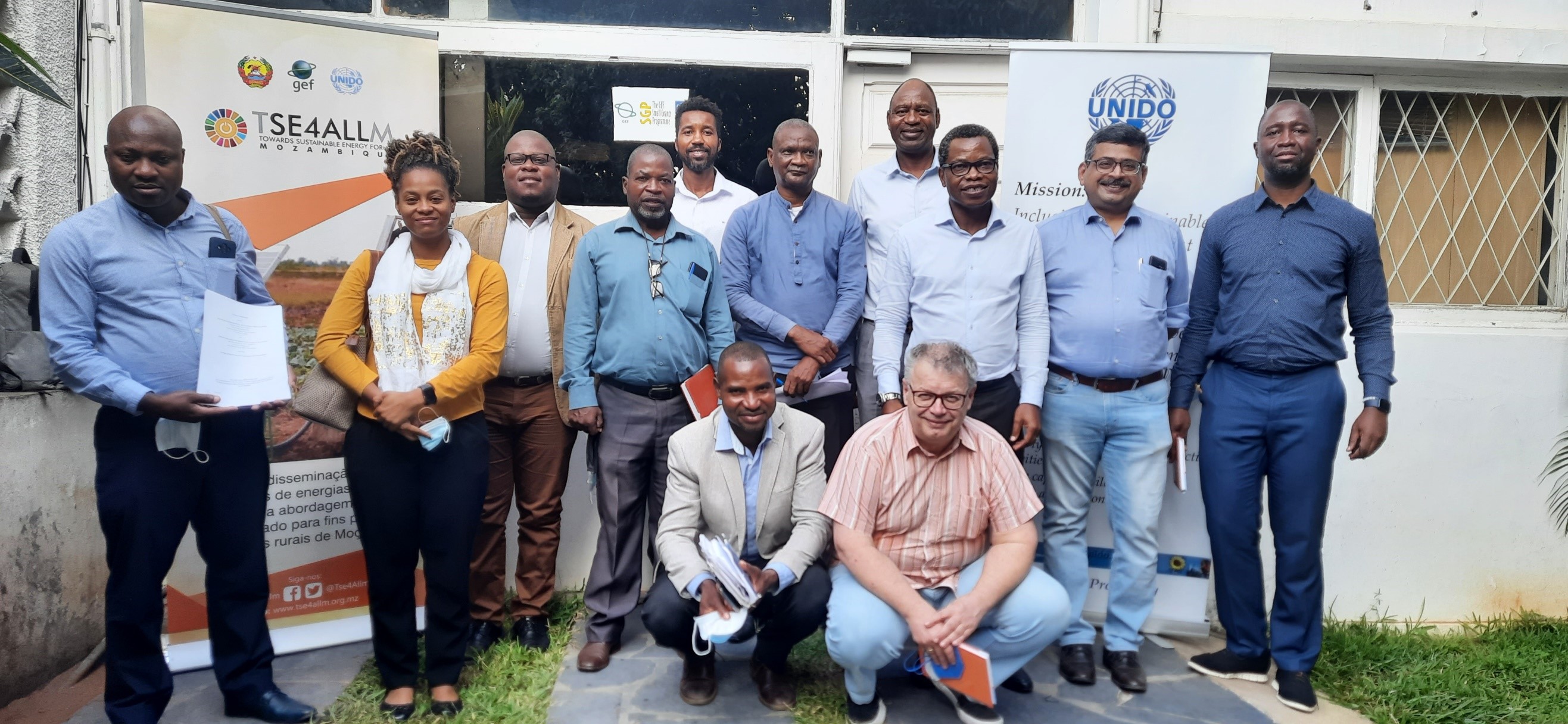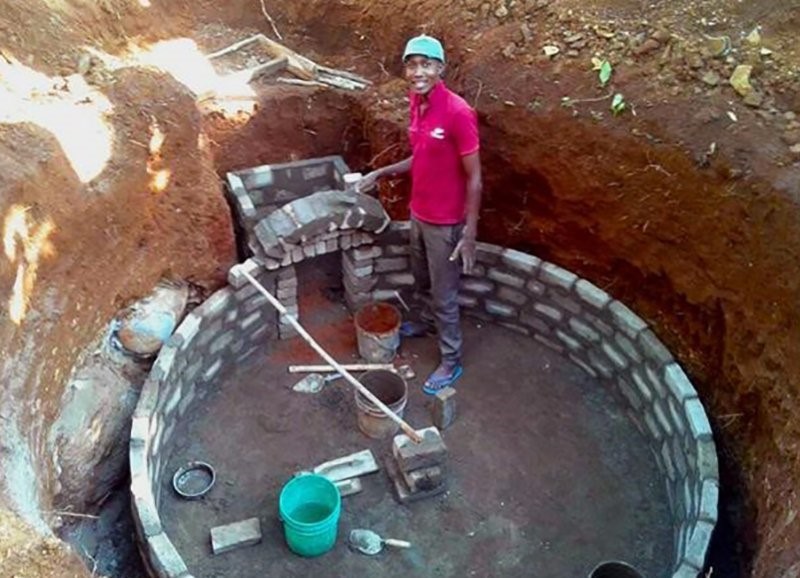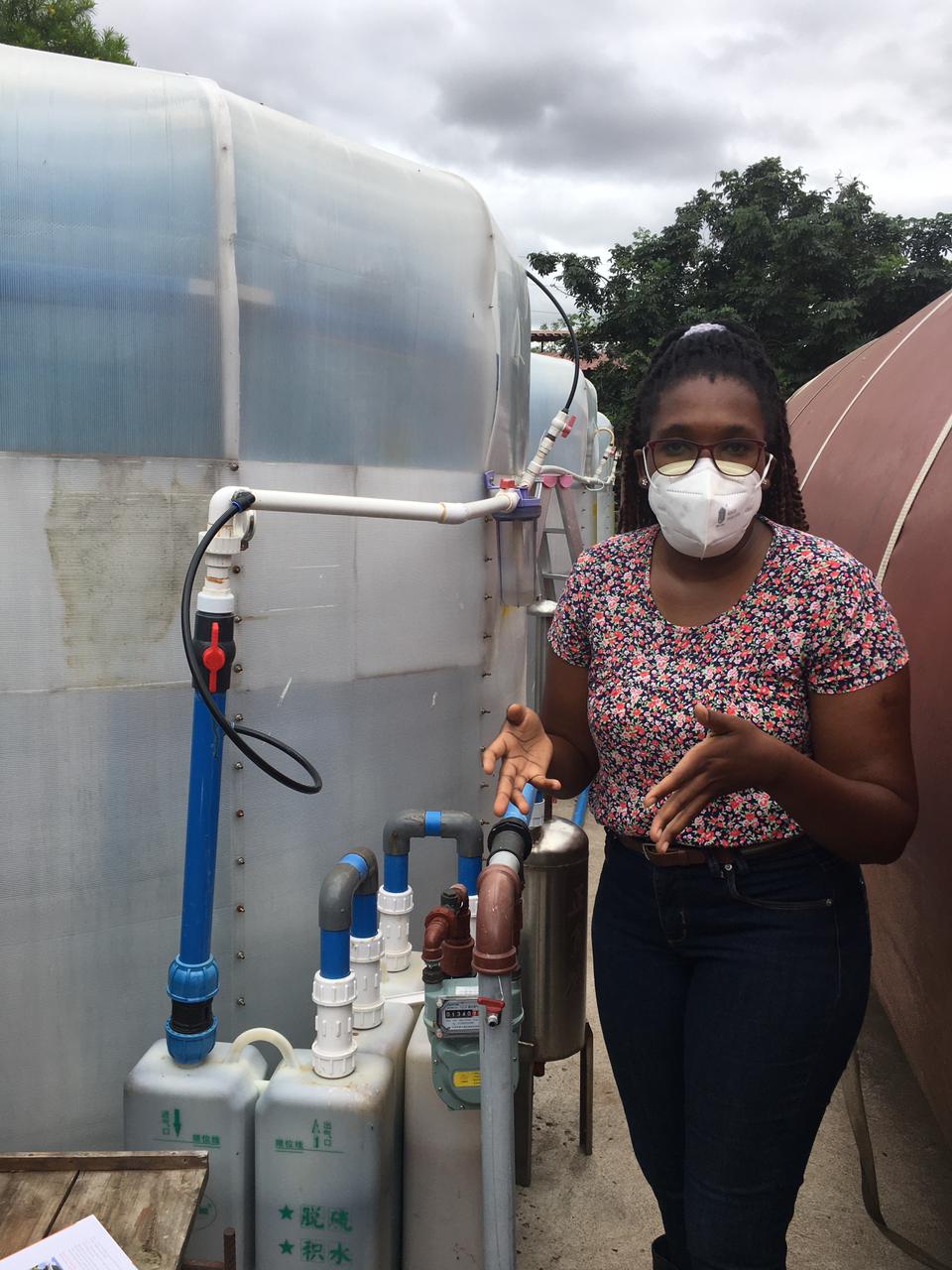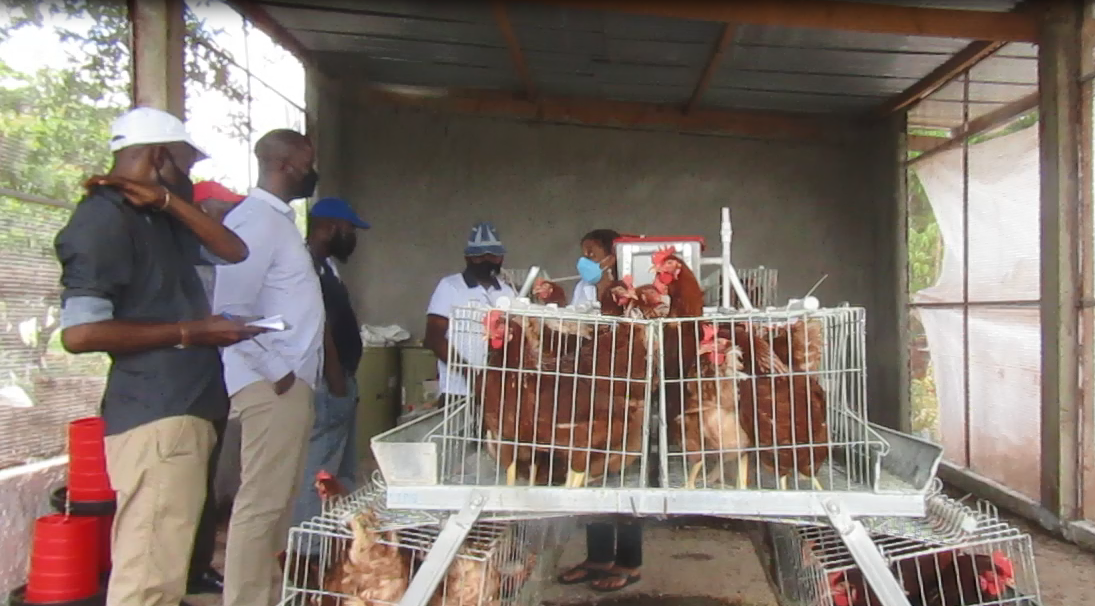
UNIDO with funding from the GEF is implementing the “Towards sustainable energy for all in Mozambique: promoting the market-based dissemination of integrated renewable energy systems for productive uses in rural areas”, project in partnership with the government of Mozambique. The project seeks among other results, to demonstrate the technical and commercial viability of renewable energy systems in the productive sector, including agriculture and the agri-food industry through 4 project components namely: (i) establishment of a conducive policy and regulatory environment; (ii) capacity building and knowledge management; (iii) technology demonstration and scaling up and (iv) monitoring and evaluation.
In 2021, a call for proposals was launched to identify investment projects for the development of renewable energy systems to support enhancing the agricultural value chain, commercial productive activities, and energy production from waste. The technological focus is on solar and biomass technologies.
From a total of 19 proposals received, and after thorough technical and commercial evaluation, three projects were selected to produce a total installed capacity of 86.9 kW at a total funding of 243,095 USD, namely AFORAMO, MAKOMANE-ADM, and CHARIS-Associacao de Solidariedade Social. AFORAMO (Association of Small Private Water Providers), Mozambique will install a 63 kW solar photovoltaic system to benefit private water providers in Maputo, Matola, Inhambane, and Manica provinces. On the other hand, MAKOMANE-ADM, Mozambique will install a solar photovoltaic system of 15.5 kW and a biodigester of 8.4 kW in Zavala district (Quissico). Finally CHARIS-Associacao de Solidariedade Social, Mozambique will install a waste to energy system with 96 m3/day of biogas production capacity, benefiting local farmers, their families, small entrepreneurs of Inhambane province.

On 6 April 2022, the TSE4ALLM project team participated in the preparation of the National Programme for Biogas Development in Mozambique, organised by the National Energy Directorate (DNE) in coordination with the Eduardo Mondlane University (UEM) and with support from the Energy Resource Centre (ERC).
The interaction with the local government leadership of Magude District revealed the potential that the district has for the production and use of organic waste and biomass "Magude district has a great potential for the development of biogas systems, due to the availability of raw materials resulting from intense agricultural and livestock activity" - Mr. Atanásio Nwito, District Permanent Secretary
Despite the fact that households in Magude district have livestock and agricultural assets for biogas energy production, the private sector and families face financial difficulties in investing in equipment for biomass generation. Biogas produced through anaerobic digestion (biodigestion) can be used for cooking as well as for electricity generation. It is believed that the potential for biomass utilisation is predominant on a national scale, particularly in areas characterised by intense agricultural and livestock activity, which can improve the lives of communities through increased energy efficiency, development of income generating activities (food preparation), reduction of environmental pollution levels resulting from the decomposition of biomass in the open air.
Information about the BCI SUPER credit line was shared with members of farmers' associations and with the district government (SDAE). TSE4ALLM project materials were shared not only with the DNE representative but also with farmers' associations and numerous questions regarding the credit line were clarified. In addition, potential partnership opportunities were identified with DNE regarding the use of biomass technology in the country.
The platform facilitated knowledge exchange on; the prerequisites for biogas projects, the concept of biogas utilization, examples of biodigesters in Mozambique and their functionality, the potential for biogas production in Magude district, different technological options for biogas, and the construction of biodigesters.

Engª Marta is a student who is developing her Master's work regarding the production and purification of biogas. "I am using the Mahubo plant as a medium for my experiment, and furthermore, my role at the Mahubo biogas plant since I have been there involves identifying possible anomalies that are taking place in the biogas production process”. In March, 2022, we had a conversation with Marta about the biodigester which will soon be complemented by a 50 kW solar photovoltaic system with support from UNIDO
What inspired you to be engaged in biogas systems?
The need to put to practice the theoretical knowledge gained during my training at UEM about biogas inspired me to get engaged in the designing and management of the Frangos de Mahubo biodigester. There are many biodigesters in the country but these do not function due to lack of people with the capacity to manage these biodigesters. There is need to disseminate the knowledge about biogas systems
Tell us about the Frangos de Mahubo biodigester
The Frangos de Mahubo Biogas plant has a capacity of 45 cubic metres and the raw materials used include chicken manure mixed with water from the toilets and blood from the slaughterhouse as the mixture for the substrate. Each day the biodigester is fed with 1.39 m3 of substrate with a retention period of 30 days. It is designed to produce 38 m3 of biogas daily.
Should biogas be consumed in the place where its produced or transmitted for consumption to other places?
Unfortunately, the major challenge with biogas production is in storage. It is not economically feasible to produce it in one place and transport it to another, this is very expensive. Thus, the ideal thing is to produce and consume it locally.
What recommendation do you have for the effective utilization of biomass?
Biomass can be used to produce energy, and can be a kick-start for energy decentralisation in various regions of the country, but first it is necessary to determine the energy needs of each area. It may be economically viable to start with small-scale biodigesters that can meet the needs of household kitchens.
What are the advantages of biogas?
There are many advantages of this technology. Firstly, raw materials are easily accessible in communities due to the availability of animal and agricultural waste. Pigs and cows, for example, are a good source of waste for biogas production, with sufficient resources and production capacity, where villages can benefit from the energy generated. Furthermore, the adoption of the technology eliminates the dependence on wood among communities, thus preserving the environment. It should be emphasised that in addition to biogas, the biodigestion process also produces biofertiliser that can be used in gardens and crops for irrigation or as fertiliser because it contains a high concentration of nutrients
Is capacity building necessary in the management of biogas plants?
Generally there is a lack of knowledge about biogas, despite the existence of huge agricultural and animal waste in the country. There are some biodigesters in the country, but they are not being used due to lack of knowledge and people with the necessary skills and minimum training to manage them. Strengthening the management capacity of biogas plants depends on the capacity of the biodigester. For example, managing a 5-10 m3 biogas plant does not require too much technical detail. There is a need to train people who deal with a biodigester, to know the quality of the raw materials needed for the biodigester and to calculate the amount of material to put into the process. One has to have the ability to assess whether there may be any factors in the biogas production process that may affect the functioning of the biodigester, for example, the pH, temperature and alkalinity. There is also a need to adjust the pH of the substrate and this can be done with some materials like calcium carbonate or local material like ash. The person in the management of the system needs to be equipped with knowledge about the need to purify the biogas produced according to its applicability. For example, if the biogas is used for cooking, there is a need to remove hydrogen sulphide (H2S) as it holds corrosive effect, can damage pipes, iron equipment, and produces a bad smell like rotten egg, causing nausea and intoxication.

The United Nations Industrial Development Organization (UNIDO) has been working with key stakeholders from the government, , financial service providers, and the private sector to address market failures that prevent the adoption of renewable energy systems in rural areas under the TSE4ALLM (Towards Sustainable Energy for All in Mozambique) project financed by GEF (Global Environmental Facility).. One of the tools developed by UNIDO to serve this purpose is COMFAR, the ( COmputer Model for Feasibility Analysis and Reporting)
As part of the capacity building and knowledge management activities of this project, a training session on COMFAR COmputer Model for Feasibility Analysis and Reporting) was organized by UNIDO with participants from FUNAE, BCI, UEM, MADER and MIREME.
It is expected that the training will bring immediate and direct results to increased efficiency of all involved parties during the operationalization of the BCI-SUPER credit line launched in April 2021, in a joint collaboration between UNIDO, BCI and FUNAE. Under this credit line, private entities seeking financial assistance receive technical assistance and orientation to develop bankable projects which are subsequently analyzed by distinct established committees on their technical and financial soundness with constant feedback to the proponent. The objective is to contribute to the prevalence of a systematic approach for the identification, appraisal, evaluation and monitoring of investment projects that will be received from the private sector.
The programme will be offered as a basic and advanced levels training. A similar programme with a higher level of intensity will be offered at a later stage to selected participants in a Training for Trainers (ToT) certification format that will ensure continuity of capacity building and knowledge transfer beyond the project timeline. At the end of the training programme participants will be able to conduct financial and economic appraisal of investment projects and will be able to construct simulations for short and long-term financial and economic situation of industrial and non-industrial investment projects.

Localizada em Mafuiane a 45 km da cidade de Maputo, a Quinta Irini, uma entidade agrícola e agro-processadora dedica-se a várias actividades agrícolas, incluindo piscicultura, apicultura fúngica, produção de cogumelos, criação de animais em pequena escala, e avicultura.
"Produzimos muitas culturas, incluindo diferentes tipos de chá, berinjelas, pepinos, pimentos, hibisco, cenouras e cogumelos. Os nossos produtos processados e bem embalados são vendidos em diferentes supermercados e feiras comerciais em Moçambique e na África do Sul" Sra. Malisa Carla, proprietária.
A quinta depende em grande parte de lenha e carvão vegetal como a maior fonte de energia utilizada no processo de pasteurização do substrato para a produção de cogumelos. O processo consome grandes quantidades de lenha para cozinhar com tambores de 200 litros de substrato, mas a escassez deste recurso nesta área está a dificultar o negócio e a impender o seu crescimento.
A região de Namaacha onde a iniciativa está baseada está a ser afectada por uma rápida tendência de desflorestação combinada com crescimento populacional, baixa produção agrícola, pobreza, insegurança alimentar, e utilização insustentável dos recursos naturais disponíveis nas comunidades, desemprego, urbanização, incêndios incontrolados, entre outros factores que estão a contribuir para o aumento da procura de combustíveis de madeira.
"Produzo cogumelos e isto envolve cozinhar o substrato em tambores de 200 litros durante mais de 5 horas, e utilizo demasiada madeira para isso". Sra. Malisa
Além disso, a Quinta Irini, tal como outras quintas na região de Maputo, sofre crises de escassez de água especialmente na estação seca, levando à perda de muitas culturas devido ao calor intenso, e à baixa ou nenhuma produção. Para reduzir o desafio, no passado, a quinta recorreu à utilização de uma bomba de água a diesel, cujo custo operacional é muito elevado e também prejudicial para outras actividades agrícolas como a piscicultura, devido à emissão de gases nocivos para o ambiente.
A Quinta Irini pretende inverter a situação, promovendo a adopção de fontes alternativas de energia. O objectivo desta iniciativa é estabelecer medidas para mudar dos sistemas tradicionais que são prejudiciais ao ambiente para sistemas mais eficientes e melhorados, bem como induzir a adopção de outras opções energéticas. As mudanças assegurarão a sustentabilidade da utilização do recurso biomassa, incluindo a utilização de resíduos para melhorar a qualidade dos solos produtivos.
"Não me dedico apenas à agricultura, mas também à criação de aves de capoeira, à rarefacção de bovinos, caprinos e coelhos, pelo que há demasiados resíduos animais que podem ser aproveitados para produzir biomassa para nos ajudar a reduzir a dependência do carvão e da madeira" Mencionou a proprietária da Quinta Irini.
A UNIDO com o apoio financeiro do Global Environment Facility (GEF) está a estabelecer uma parceria com o Ministério da Agricultura e Desenvolvimento Rural - Direcção Nacional para o desenvolvimento económico local para implementar um projecto de demonstração de sistemas integrados de energias renováveis na Quinta Irini. O objectivo do projecto-piloto é demonstrar como a adopção de sistemas integrados de energiais renováveis para usos produtivos pode contribuir para o aumento da sustentabilidade, produtividade e eficiência nos processos de produção e comercialização de produtos agrícolas na zona rural de Mafuiane.
"O projecto irá instalar os seguintes sistemas integrados; Sistema de fornecimento de água solar para irrigação e agro-processamento; Secadores solares para frutas e vegetais; Moagem solar; e um Digestor anaeróbio para produção de biogás e fertilizantes".
----Eng. Tiago, Ministério da Agricultura

